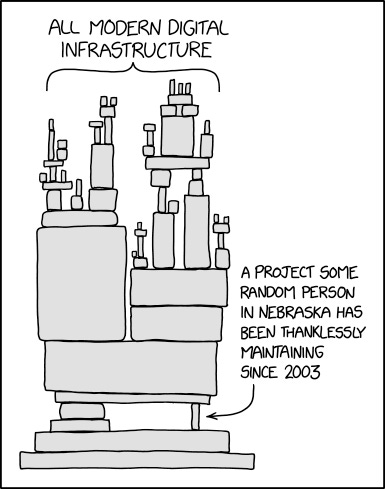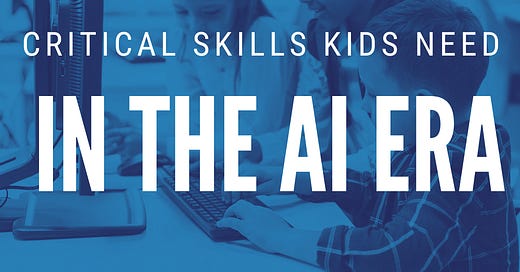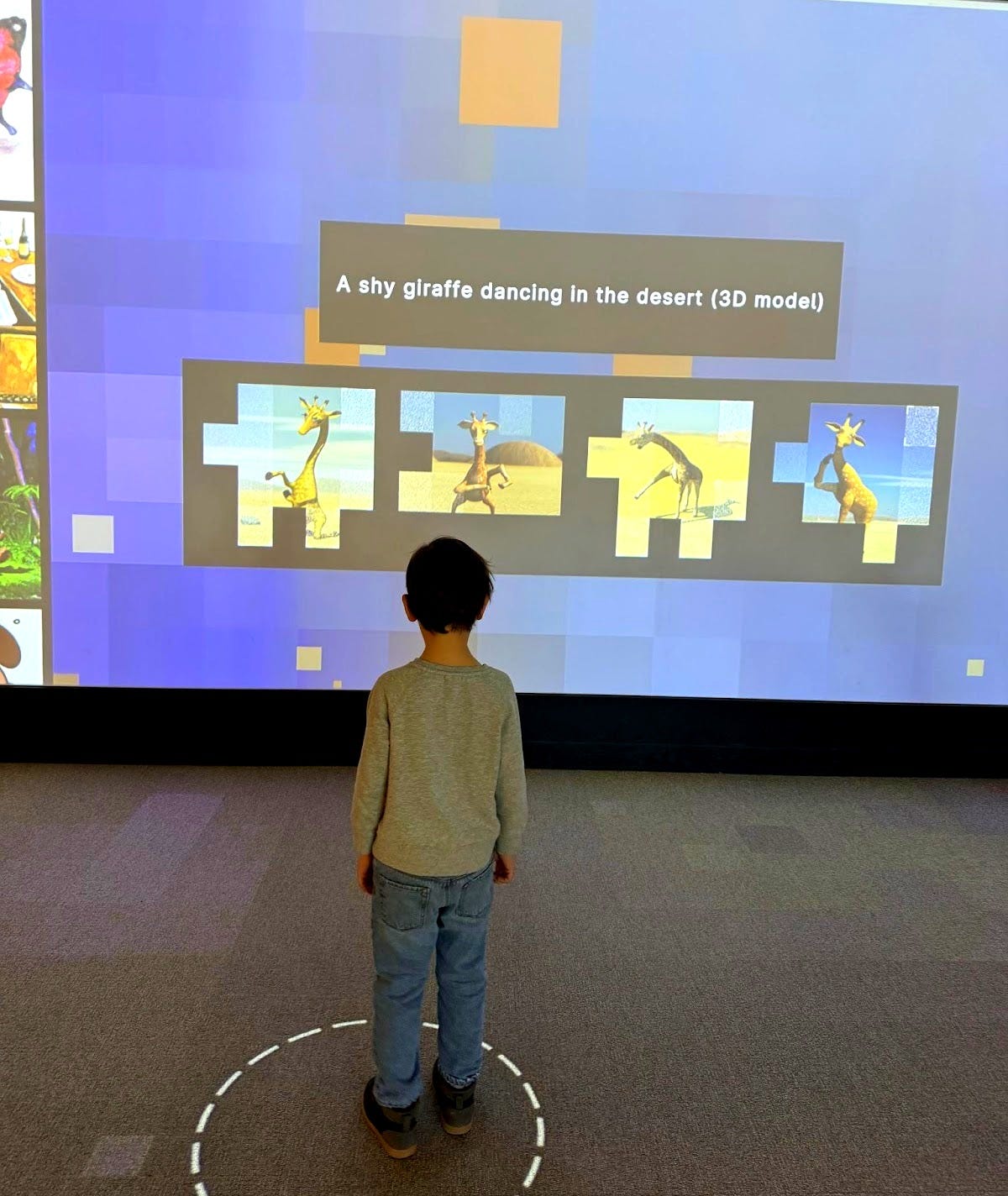10 Critical Skills Kids Need in the AI Era
What skills do the next generation need to thrive in the age of AI? Exploring the benefits of AI and the potential risks when it comes to the next generation.
AI Transparency Disclaimer: As we move into this new era, it’s critical that we start normalizing and openly discussing where we use AI. No parts of this article were written or edited with AI. However, we did use AI to help research this article. Our approach is to start with credible sources and use AI to help summarize the articles to pull out the key findings and more related articles to review.
It’s inevitable: we’re in the era of AI. According to a recent study from YouGov, 59% of Americans knowingly use AI tools at least occasionally – among Gen Z, that number jumps to 82%! AI is everywhere, whether you realize it or not. Sure, the algorithms that recommend the next video to watch or the next song to listen to are all AI powered these days. But what about the pizza guy or the receptionist at your dentist’s office? It’s impossible to be online without interacting with AI.
How can kids benefit from AI?
But what about the children?! Before we go all doom and gloom, AI offers several benefits to kids:
Information on-demand: Children are naturally curious and love to ask questions: it’s how they learn about the world. Any parent of a young child won’t be surprised to hear that children can ask between 100 and 300 questions a day! And what is an AI, if not a magical, never-ending question answerer? Obviously, AI is not a replacement for kids asking their care-givers questions, but it is a useful addition (or break for the adults).
Personalized learning experiences: Researchers at Harvard Graduate School of Education have developed AI companions that engage with kids while they are doing activities like reading books. The companions ask the kids questions and respond to their answers, much the way a parent or teacher might. The researchers found that the kids who used the AI Companions had better comprehension of the stories and learned more vocabulary compared to kids who didn’t have the companion. Again, not a replacement for human interaction! But it can augment when otherwise the child would be playing alone.
Unconstrained exploration: AI lets children use language to create written, visual, video, and experiential content. Kids are unencumbered in most cases by specific goals and preconceptions of what an outcome looks like. This makes creative, non-judgemental mediums perfect for exploration and goal-less learning.
Protecting kids in the era of AI - It’s time to teach AI Literacy
In every era, caregivers ask the question “how do we prepare our children for success in the next era of technology?” We’re not here to cause the next techno-moral panic, but there is a real human impact when using AI that we need to consider. In our research, the most concerning issue that rises to the surface is the impact of cognitive offloading. The concept of cognitive offloading has been around for some time – it’s the term for using digital tools to free up working memory. We’ve seen the impact of this for years. Here’s a simple example:just 15 - 20 years ago, most of us could navigate without Google Maps. Now for many people jumping in the car without their phone to map their route is unthinkable. Recent studies have shown that the ease in which we can access ready-to-consume data via AI is potentially accelerating this cognitive offloading trend. What happens when we do too much cognitive offloading? Some of the potential consequences are terrifying, including the erosion of core skills like “memory retention, analytical thinking, and problem-solving,” especially in younger people. Yes, it’s scary. But it’s also very early days of this research, and if we prepare the next generation well, this doesn’t have to be a foregone conclusion.
Raising the AI-native generation
Just like younger Millennials and Gen Z are considered “digital natives,” Gen Next will be ”AI native.” When today’s young children have the opportunity to interact with AI, they appear to have a preternatural ability to give commands and prompts and get the outputs they need. The question is, how can we both mitigate the risks to reduce harm and set them up for success in the era of AI?
Critical skills for the generation growing up in the age of AI
There’s long been a concept of digital literacy, but we need to take this a step further. How can we teach AI literacy? Digital literacy focuses on questioning the credibility of information that you find online. But AI might not provide its sources and it can potentially come across as more credible. In addition to AI Literacy, what are the key skills that kids need to excel in this era? After some research and analysis, we’ve come up with what we consider to be the 10 essential skills for kids.
Hard skills for the AI era
AI fundamentals. How does AI work? What is it? What is it not? Helping kids understand how AI and LLMs function will help them understand their limitations. AI is not magic and the more kids understand about how they function will help them spot errors and recognize when it’s the right tool.
Critical thinking. The best definition we’ve found for critical thinking is from Coursera: “Critical thinking is the ability to interpret, evaluate, and analyze facts and information that are available, to form a judgment or decide if something is right or wrong.” In the age of AI, all of us need a healthy dose of skepticism. In other words, we need the best BS detectors. Critical thinking is the perfect mix of skills to interpret the output of AI and will help counteract any impacts of cognitive offloading.
Grit. In the age of AI, kids need to be persistent problem solvers, with the power to persevere through roadblocks. There’s been some concern that AI reduces the productive struggle. Productive struggle is persevering through challenges and frustration to resolve an issue. While one could argue that this has been a problem for as long as we’ve had good search engines, it's definitely possible that AI will exacerbate this. Teaching problem solving and how to embrace the productive struggle without giving up will counteract this.
Attention to detail and thoroughness. Closely related to critical thinking and grit are the skills of attention to detail and thoroughness. When working with AI-generated output, you need to carefully comb through it and find the thing that doesn’t make sense. Notice that there is a 6th finger on that hand. Go dig into the source of a sentence that doesn’t seem quite right. Don’t take shortcuts, review all of it, even if it looks ok. AI will hallucinate incredibly convincingly, you need to look carefully, spot the patterns and inconsistencies and check the work. One important point about AI is that it will always correct when you point out an error, but only after you flag the error. That’s why close and critical reading and asking for sources is so important when interacting with AI.
AI cost and impact. Interacting with an AI consumes compute cycles, and therefore has a power and cooling impact. This is an obvious cause and effect, but the power and cooling footprint of an AI query is significantly bigger than something like a search engine query. In a recent interview, the chairman of Alphabet (Google’s parent company) admitted that interacting with an LLM could “likely cost 10 times more than a standard keyword search”. That doesn’t mean the costs won’t come down, but in the meantime, it’s important to be thoughtful about signing up and consuming endless tools and services. Kids should understand that, like water and electricity, AI is not a free and unlimited resource, and before they use it, they should consider if there are other approaches that could get them the outputs they’re looking for.
Clear communication. The best AI will never replace the best human communicators, especially writing. We foresee a future in which kids start to rely heavily on AI as a writing and communication tool and never learn to be clear, concise, and persuasive communicators themselves. In addition, clear and specific instructions will yield the best results when communicating with an AI.
Soft skills for the AI era
Curiosity. Developing an investigative mindset that asks "how" and "why." Encouraging kids to look under the hood, question assumptions, and explore new possibilities with AI tools rather than just consuming them.
Creativity and out of the box thinking. Thanks to AI, we’re currently in an age where the only limitation on new products, new features, new problems solved is the limits of our imagination. AI can tackle so many big problems, but it’s only as smart as the prompts it gets. We need to teach “big thinking” to the next generation so they can work on solving the some really big problems. On top of that, we firmly believe that creative pursuits will never be replaced by AI and we must encourage the next generation to continue to create art.
Adaptability: Building comfort with change and uncertainty. As AI evolves rapidly, the ability to learn, unlearn, and relearn becomes more valuable than mastering any single tool or approach. Have regular discussions with your kids about change and what a given change implies for them, for the community, for the world.
Social etiquette. When was the last time you thanked Siri or Alexa? You may even have a certain tone of voice you use when you speak to an AI assistant (purely hypothetically). Or maybe you have a spouse who is always on your case to be nicer to Alexa as a good example for your kids (also hypothetical). Is the answer to just start teaching kids to say “please” when they query ChatGPT? Maybe. But also maybe we just take the time to reinforce manners and other social etiquette to our fellow humans. Because AIs are not human, and this is an important distinction for kids to understand.
To code, or not to code, that is the question
You may notice that there is a key skill missing from this list: coding. It’s really still an open question: Does it still make sense to teach kids how to code? If so, how should we be teaching them differently? In short, the answer is YES, we still should teach kids to code, but it needs to be with a different focus. Mastering specific languages (Python vs Go vs Java) no longer makes sense. But becoming conversant in programming structure, logic, syntax in many different languages is still a crucial skill. The world still runs on code, and humans still need to understand it in order to keep it running. However, we need to accept the fact that there will likely be significantly fewer software engineering jobs in the future and they may not command as much of a premium salary in the job market. For those who are looking to help their kids learn a lucrative skill, software engineering is likely NOT your best bet. But have you considered plumbing?

Kids learn through play, and technology should be no different. While today's children are growing up with AI as a seemingly magical black box, there's tremendous value in understanding how things work under the hood. Those of us who witnessed the evolution of modern technology had the advantage of seeing it built piece by piece – from dial-up modems to smartphones, from basic HTML to complex web applications. This gradual exposure helped us understand fundamental concepts that we could apply across different tools and situations.
The same principle applies to children learning about technology today. By encouraging them to tinker with code and explore how things are built, we help them develop a deeper understanding that goes beyond just using tools. When they grasp these foundational concepts, they're better equipped to think critically about AI outputs and understand its limitations rather than treating it as an answer machine.
Final thoughts
The AI era doesn't have to be a scary place for kids and for their caregivers. Just like we taught digital literacy to help kids navigate the internet safely, we now need to focus on AI literacy to help them thrive in an AI-powered world. As with most things in parenting, the key is balance – embracing AI's benefits while developing crucial human skills that AI can't replicate.
What matters most isn't teaching kids to compete with AI, but rather to harness it as the powerful tool that it is. Critical thinking, creativity, grit, thorough analysis, and strong communication skills will set them apart. Let them explore and create with AI, but also ensure they can think independently and solve problems when the AI is turned off.
The pace of AI advancement means today's tools might look completely different tomorrow. By fostering curiosity and adaptability in our kids, we're equipping them with something more valuable than specific AI skills – we're teaching them how to learn, evolve, and think critically about new technologies as they emerge. They won't just use AI – they'll help determine how it evolves and impacts our world.
If you enjoyed this piece, consider subscribing to
’s excellent newsletter — he’s writing a lot of great content about the cultural and organizational changes ushered in by the AI Era.Sources and further reading:
The Essential Skills for Children in the Age of AI
How the Era of Artificial Intelligence Will Transform Society?
AI Literacy: A Framework to Understand, Evaluate, and Use Emerging Technology
The Impact of AI on Children's Development | Harvard Graduate School of Education
AI Will Transform Teaching and Learning. Let’s Get it Right.
The growing energy footprint of artificial intelligence - ScienceDirect














Great piece! Perhaps critical thinking is the bottom line here. We can use AI, but at the end of the day, nothing can replace human agency (yet).